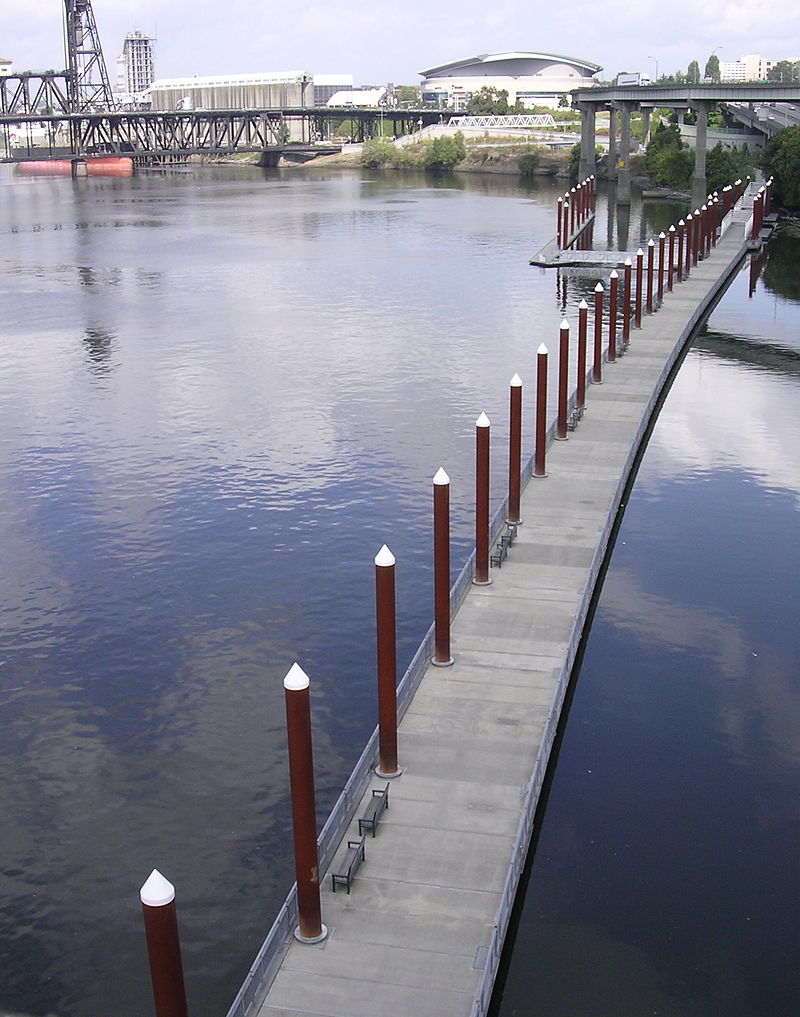The recent prevalence of e-bikes on Portland streets, and the even more recent influx of e-scooters, has increased the public’s curiosity about state and local law governing the devices. Many Portlanders now know that e-bikes and e-scooters are prohibited on sidewalks statewide, users of both must be at least 16 years old, and e-scooter users must wear helmets, but not e-bike riders. (For a comprehensive look at Oregon e-bike law, see our firm’s legal guide here.) A lesser known provision of Portland city code came to my attention recently in an article by the Oregonian’s Lizzy Acker, which included the following statement:
I emailed Portland Bureau of Transportation spokesperson John Brady on Friday to ask him some question about the scooters and he informed me that city code does not allow scooters in city parks, including the esplanade and the Springwater Corridor, so I can’t recommend you take this route home.
It seemed strange to me that critical bicycle and pedestrian corridors like the Springwater and Esplanade would be off limits to e-scooters, so I decided to take a look at the code to learn more. The relevant provision is not located in Title 16, which governs Vehicles and Traffic, but rather under Title 20 governing Parks and Recreation. Although the Springwater and Esplanade don’t resemble typical parks, they are controlled by Parks and Recreation and so are subject to the same rules as more conventional park spaces like Pioneer Square and Irving Park. After some digging, I came across 20.12.170, which regulates Use of Certain Devices or Equipment. Subsection (D) of that ordinance states as follows:
20.12.170 Use of Certain Devices or Equipment.
D. No person shall operate any motorized vehicle or motorized wheeled vehicle or motorized wheeled device in any Park, except on Park roads or in designated vehicle parking areas, or by permit. The prohibitions of this Section do not apply to authorized service or emergency vehicles or to the following electric mobility devices used by persons who need assistance to be mobile, and used in accordance with all applicable park and traffic rules:
1. “Electric assisted bicycle” as defined in ORS 801.258;
2. “Motorized wheelchair,” “Mobility scooter” or “Power chair” defined as an electric powered transportation device for one person in a seated position, with feet resting on floorboards or foot rests, and incapable of exceeding a speed of 20 mph; or
3. “Human or personal transporter system” defined as a self-balancing, electric-powered transportation device with two wheels, able to turn in place, and designed to transport one person in a standing position, with a top speed of 20 mph.
Assuming e-scooters constitute “motorized vehicle or motorized wheeled vehicle or motorized wheeled device,” which is fair, they do appear to be prohibited from use in Parks, which are defined in 20.04.010 as property “placed under the jurisdiction of Portland Parks and Recreation for park or recreational purposes.” The prohibition on e-scooters alone seems significant, given the important role served by Parks like the Springwater and Esplanade in the City’s bike and pedestrian infrastructure. However, the provision that really caught my eye from the above code provision relates to e-bikes. 20.12.170(D) subsection (1) exempts e-bikes from the general prohibition on “motorized vehicle or motorized wheeled vehicle or motorized wheeled device”, but only when “used by persons who need assistance to be mobile.”
Therefore, non-disabled e-bike riders are granted no exception to the e-bike prohibition, and are prohibited on all Park paths throughout the City. According to the Portland Parks directory, Parks include not only the Springwater, Esplanade, and Waterfront Park, but also the Peninsula Crossing Trail, Gateway Green, Forest Park and Powell Butte. Indeed, Portland law excludes non-disabled e-bike riding on some of the City’s most convenient, safe, and scenic bicycle corridors.
The prohibition of non-disabled e-bike use, as well as all e-scooter use, from many of our City’s prized bicycle and pedestrian facilities seems inconsistent with the City’s stated goals of fighting climate change, promoting non-car transportation, and improving safety for vulnerable road users. The Springwater and Esplanade epitomize the type of car-free and efficient infrastructure that make bicycle commuting through Portland an attractive alternative to driving. If the City is serious about accomplishing its goals, it needs to act soon to allow at least some level of e-bike and e-scooter access to these areas by non-disabled Portlanders.
Some may question whether a change in the code is truly necessary given the lack of any apparent enforcement by the City of the above provision. However, despite no current, active enforcement, the code should be updated because it reflects our priorities as a City. Also, if a collision happens that causes injury to an e-bike or e-scooter user, the injured party could face a defense that they were legally a trespasser and shouldn’t have been in the park in the first place. Though it may seem like an obscure, unenforced code provision now, it could still create an excuse for failing to pay for damages caused by negligence.
It recently came to light that the state’s park agency, Oregon Parks and Recreation, interprets state rules to prohibit e-bike users from trails in Oregon State Parks because they fall under the agency’s definition of motor vehicles. As a result, Oregon Parks and Recreation initiated a process to change the rules and allow e-bikes on state park trails, with reasonable restrictions on use. In recognition of the important role e-bikes and e-scooters can play in our City’s transportation future, we think the City of Portland should take similar action.
Image credit: “The Esplanade’s floating section” by Wikipedia User: Cacophony under CC BY 2.5

